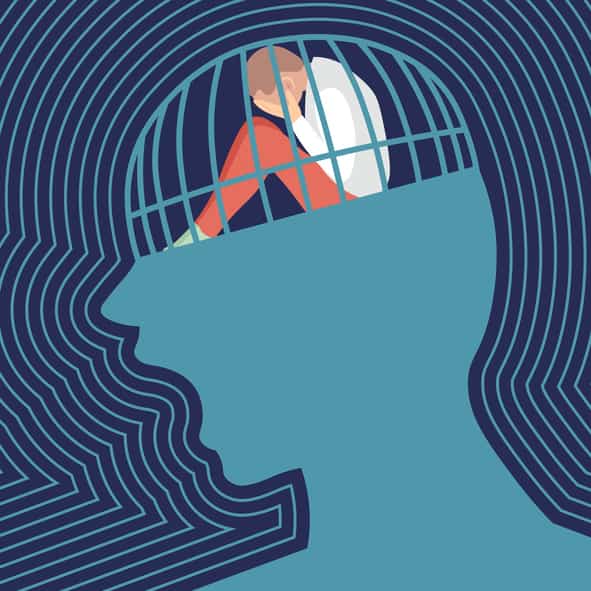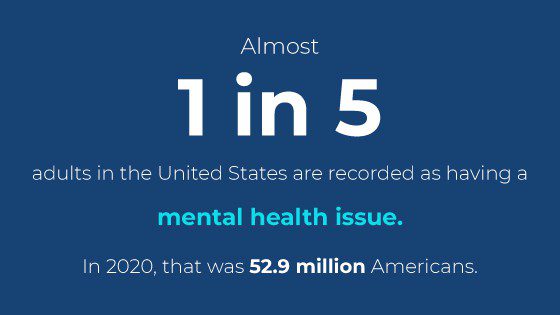10 Signs You May Need Mental Health Treatment [Find Help]



Life is difficult, especially during the developmental years of teens and young adults. Adolescents are dealing with peer pressure, school, work, finding an apartment, hormones, and parental expectations, all while trying to figure out who they are as a person.
Not every struggle is due to a mental illness, but it is important to know the warning signs so you can identify when you or a loved one needs some extra help.
General warning signs of mental illness in teens and young adults can include:

If you suspect you may be experiencing symptoms of a mental illness, it is best to reach out to a mental health professional to get a proper diagnosis.

Most mental illnesses and mood disorders are not caused or “triggered” by one singular thing. There may be many risk factors that play a role in the onset of a mental health issue.
A mental illness is considered to be serious when severely interferes with and restricts your ability to complete daily life tasks or social activities.
According to the NIMH, “in 2020, There were an estimated 14.9 million adults 18 and older who were diagnosed with a serious mental illness. Young adults aged 18-25 years had the highest prevalence of SMI (9.7%) compared to adults aged 26-49 years (6.9%) and aged 50 and older (3.4%).“
While there are many different kinds of serious mental illnesses, the most common ones include schizophrenia-spectrum disorders, severe bipolar disorder, and severe major depression.
Bipolar disorder is categorized as a brain disorder where a person experiences intense mood swings, ranging from euphorically happy to depressively sad.
Schizophrenia is a severe mental health disorder where the person is unable to perceive reality in a normal way. They may hallucinate, have paranoia, disordered thinking; all of which severely interfere with their ability to function in daily life.
Major Depressive Disorder is one of the most common kinds of mental illness. While the symptoms and signs vary from person to person, common symptoms include feelings of hopelessness, worthlessness, anxiety, low energy, abnormal sleep patterns, and severe sadness that interfere with the person’s overall well-being and ability to sleep, eat, or work.
According to the Mayo Clinic, “if you have any signs or symptoms of a mental illness, see your primary care provider or mental health professional. Most mental illnesses don’t improve on their own, and if untreated, a mental illness may worsen over time and cause serious problems.”
Not to mention, trust your gut. If you feel like you need help then reach out to your parents, friends, or a professional and find yourself the help you need. Life is tough enough as it is; Sandstone Care is here if you need to talk.
The Diagnostic and Statistical Manual of Mental Disorders lists nearly 300 different mental health disorders.
When you explore the signs and determine you may need mental health treatment, there are many different treatment options available. These options include, but are not limited to group, individual, or family therapy, as well as support groups.
The National Alliance on Mental Illness reminds us that “choosing the right mix of treatments and supports that work for you is an important step in the recovery process. Treatment programs for mental health conditions will vary from person to person.”
While many different factors may keep an individual from seeking mental health treatment, some of the most common reasons are judgment, fear, doubt, misinformation, and not wanting to admit that they need help.
Historically there have been stigmas surrounding mental health and wellness. This means that society has placed shame and judgment on people struggling with and seeking help for mental health concerns. Thankfully these stigmatisms are lifting and seeking help is now widely accepted and encouraged.
So if you have read, the 10 signs you may need mental health treatment, and determined that you may need help, don’t worry about what others think, and please reach out to a professional to begin your wellness journey.

When a mental illness is left untreated, it can easily get worse and have extreme consequences for the person who is struggling, as well as for those around them. These consequences may include unemployment, injury or disability, homelessness, substance abuse, or suicide.
There are many helplines, resources, and outlets for people experiencing a mental health crisis. If you or someone you know is having suicidal thoughts, call the National Suicide Prevention Hotline at 800-273-8255.
There are several factors that could worsen a person’s mental health. These factors could be an environmental influence, like a traumatic event, or simply from leaving a mental health issue untreated. Physical health also plays a major role in staying mentally healthy.
Once you have been diagnosed with a mental health disorder, it is important to be proactive with your wellness. There are many mental health services, including Sandstone Care, that provide a range of treatment options from inpatient to outpatient.
Mental health concerns are real, more common than you think, and thankfully treatable with health care providers like Sandstone Care.
If you or a loved one is struggling with mental health or substance use issues, call (888) 850-1890 to speak with a Sandstone advisor and learn more about treatment options and how to find the help you need.


We understand taking the first step is difficult. There is no shame or guilt in asking for help or more information. We are here to support you in any way we can.